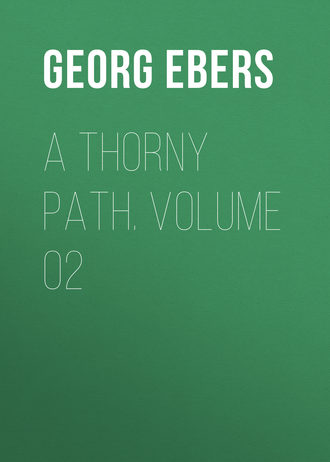
Georg Ebers
A Thorny Path. Volume 02
Nor had she deceived herself, for Diodoros made Alexander's cause his own, in his eager, vehement way; and the plan for his deliverance seemed doubly admirable as proceeding from Melissa. In a few minutes Alexander and the sculptor were released from their hiding-place, and all further care for them was left to Diodoros.
They were both very, craftily disguised. No one would have recognized the artists in two sailors, whose Phrygian caps completely hid their hair, while a heavy fisherman's apron was girt about their loins; still less would any one have suspected from their laughing faces that imprisonment, if nothing worse, hung over them. Their change of garb had given rise to so much fun; and now, on hearing how they were to be smuggled into the town, their merriment grew higher, and proved catching to those who were taken into the secret. Only Melissa was oppressed with anxious care, in spite of her lover's eager consolation.
Glaukias, a man of scarcely middle height, was sure of not being recognized, and he and his comrades looked forward to whatever might happen as merely an amusing jest. At the same time they had to balk the hated chief of the city guards and his menials of their immediate prey; but they had played them a trick or two ere now. It might turn out really badly for Alexander; still, it was only needful to keep him concealed till Caesar should arrive; then he would be safe, for the Emperor would certainly absorb all the thoughts and time of the captain of the night-watch and his chief officers. In Alexandria, anything once past was so soon forgotten! When once Caracalla was gone—and it was to be hoped that he would not stay long—no one would ever think again of any biting speech made before his arrival.
The morning must bring what it might, so long as the present moment was gay!
So, refreshed and cheered by rest and wine, the party of mystics prepared to set out again; and, as the procession started, no one who did not know it had observed that the two artists, disguised as sailors, were, by Melissa's advice, hidden inside the kalathos of Serapis, which would easily have held six, and was breast-high even for Alexander, who was a tall man. They squatted on the floor of the huge vessel, with a jar of wine between them, and peeped over now and then with a laugh at the girls, who had again seated themselves on the edge of the car.
When they were fairly on their way once more, Alexander and his companions were so daring that, whenever they could do it unobserved, they pelted the damsels with the remains of the corn, or sprinkled them with wine-drops. Glaukias had the art of imitating the pattering of rain and the humming of a fly to perfection with his lips; and when the girls complained of the tiresome insect buzzing in their faces, or declared, when a drop fell on them, that in spite of the blue and cloudless sky it was certainly beginning to rain, the two men had to cover their mouths with their hands, that their laughter might not betray them.
Melissa, who had comforted Ino with the assurance that Alexander had been called away quite unexpectedly, was now sitting by her side, and perceived, of course, what tricks the men in the kalathos were playing; but, instead of amusing her, they only made her anxious.
Every one about her was laughing and joking, but for her all mirth was at an end. Fear, indeed, weighed on her like an incubus, when the car reached the bridge and rattled across it. It was lined with soldiers and lictors, who looked closely at each one, even at Melissa herself. But no one spoke to her, and when the water lay behind them she breathed more freely. But only for a moment; for she suddenly remembered that they would presently have to pass through the gate leading past Hadrian's western wall into the town. If Zminis were waiting there instead of on the bridge, and were to search the vehicle, then all would be lost, for he had looked her, too, in the face with those strange, fixed eyes of his; and that where he saw the sister he would also seek the brother, seemed to her quite certain. Thus her presence was a source of peril to Alexander, and she must at any cost avert that.
She immediately put out her hand to Diodoros, who was walking at her side, and with his help slipped down from her seat. Then she whispered her fears to him, and begged him to quit the party and conduct her home.
This was a surprising and delightful task for her lover. With a jesting word he leaped on to the car, and even succeeded in murmuring to Alexander, unobserved, that Melissa had placed herself under his protection. When they got home, they could tell Heron and Andreas that the youths were safe in hiding. Melissa could explain, to-morrow morning, how everything had happened. Then he drew Melissa's arm through his, loudly shouted, "Iakchos!" and with a swift dance-step soon outstripped the wagon.
Not fifty paces beyond, large pine torches sent bright flames up skyward, and by their light the girl could see the dreaded gateway, with the statues of Hadrian and Sabina, and in front of them, in the middle of the road, a horseman, who, as they approached, came trotting forward to meet them on his tall steed. His head towered above every one else in the road; and as she looked up at him her heart almost ceased beating, for her eyes met those of the dreaded Egyptian; their white balls showed plainly in his brown, lean face, and their cruel, evil sparkle had stamped them clearly on her memory.
On her right a street turned off from the road, and saying in a low tone, "This way," she led Diodoros, to his surprise, into the shadow. His heart beat high. Did she, whose coy and maidenly austerity before and after the intoxication of the dance had vouchsafed him hardly a kind look or a clasp of the hand-did she even yearn for some tender embrace alone and in darkness? Did the quiet, modest girl, who, since she had ceased to be a child, had but rarely given him a few poor words, long to tell him that which hitherto only her bright eyes and the kiss of her pure young lips had betrayed?
He drew her more closely to him in blissful expectation; but she shyly shrank from his touch, and before he could murmur a single word of love she exclaimed in terror, as though the hand of the persecutor were already laid on her: "Fly, fly! That house will give us shelter."
And she dragged him after her into the open doorway of a large building. Scarcely had they entered the dark vestibule when the sound of hoofs was heard, and the glare of torches dispelled the darkness outside.
"Zminis! It is he—he is following us!" she whispered, scarcely able to speak; and her alarm was well founded, for the Egyptian had recognized her, and supposed her companion to be Alexander. He had ridden down the street with his torchbearers, but where she had hidden herself his keen eyes could not detect, for the departing sound of hoofs betrayed to the breathless listeners that the pursuer had left their hiding-place far behind him. Presently the pavement in front of the house which sheltered them rang again with the tramp of the horse, till it died away at last in the direction of Hadrian's gate. Not till then did Melissa lift her hand from her painfully throbbing heart.
But the Egyptian would, no doubt, have left his spies in the street, and Diodoros went out to see if the road was clear. Melissa remained alone in the dark entrance, and began to be anxious as to how she could explain her presence there if the inhabitants should happen to discover it; for in this vast building, in spite of the lateness of the hour, there still was some one astir. She had for some minutes heard a murmuring sound which reached her from an inner chamber; but it was only by degrees that she collected herself so far as to listen more closely, to ascertain whence it came and what it could mean.
A large number of persons must be assembled there, for she could distinguish several male voices, and now and then a woman's. A door was opened. She shrank closer to the wall, but the seconds became minutes, and no one appeared.
At last she fancied she heard the moving of benches or seats, and many voices together shouting she knew not what. Then again a door creaked on its hinges, and after that all was so still that she could have heard a needle drop on the floor; and this alarming silence continued till presently a deep, resonant man's voice was audible.
The singular manner in which this voice gave every word its full and equal value suggested to her fancy that something was being read aloud. She could distinctly hear the sentence with which the speech or reading began. After a short pause it was repeated somewhat more quickly, as though the speaker had this time uttered it from his own heart.
It consisted of these six simple words, "The fullness of the time was come"; and Melissa listened no more to the discourse which followed, spoken as it was in a low voice, for this sentence rang in her ears as if it were repeated by an echo.
She did not, to be sure, understand its meaning, but she felt as though it must have some deep significance. It came back to her again and again, like a melody which haunts the inward ear against our will; and her meditative fancy was trying to solve its meaning, when Diodoros returned to tell her that the street was quite empty. He knew now where they were, and, if she liked, he could lead her by a way which would not take them through the gate. Only Christians, Egyptians, and other common folks dwelt in this quarter; however, since his duty as her protector had this day begun, he would fulfill it to the best of his ability.
She went with him out into the street, and when they had gone a little way he clasped her to him and kissed her hair.
His heart was full. He knew now that she, whom he had loved when she walked in his father's garden in her little child's tunic, holding her mother's hand, returned his passion. Now the time was come for asking whether she would permit him to beg her father's leave to woo her.
He stopped in the shadow of a house near, and, while he poured out to her all that stirred his breast, carried away by tender passion, and describing in his vehement way how great and deep his love was, in spite of the utter fatigue which weighed on her body and soul after so many agitations, she felt with deep thankfulness the immense happiness of being more precious than aught else on earth to a dear, good man. Love, which had so long lain dormant in her as a bud, and then opened so quickly only to close again under her alarms, unfolded once more and blossomed for him again—not as it had done just now in passionate ecstasy, but, as beseemed her calm, transparent nature, with moderated joy, which, however, did not lack due warmth and winning tenderness.
Happiness beyond words possessed them both. She suffered him to seal his vows with kisses, herself offering him her lips, as her heart swelled with fervent thanksgiving for so much joy and such a full measure of love.
She was indeed a precious jewel, and the passion of his stormy heart was tempered by such genuine reverence that he gladly kept within the bounds which her maidenly modesty prescribed. And how much they had to say to each other in this first opening of their hearts, how many hopes for the future found utterance in words! The minutes flew on and became hours, till at last Melissa begged him to quit the marble seat on which they had so long been resting, if indeed her feet could still carry her home.
Little as it pleased him, he did her bidding. But as they went on he felt that she hung heavy on his arm and could only lift her little feet with the greatest difficulty. The street was too dark for him to see how pale she was; and yet he never took his eyes off her dear but scarcely distinguishable features. Suddenly he heard a faint whisper as in a dream, "I can go no farther," and at once led her back to the marble seat.
He first carefully spread his mantle over the stone and then wrapped her in it as tenderly as a mother might cover her shivering child, for a cooler breeze gave warning of the coming dawn. He himself crept close under the wall by her side, so as not to be seen, for a long train of people, with servants carrying lanterns before them, now came out of the house they had just left and down the street. Who these could be who walked at so late an hour in such solemn silence neither of them knew. They certainly sent up no joyful shout of "Iakchos!" no wild lament; no cheerful laughter nor sounds of mourning were to be heard from the long procession which passed along the street, two and two, at a slow pace. As soon as they had passed the last houses, men and women alike began to sing; no leader started them, nor lyre accompanied them, and yet their song went up as though with one voice.
Diodoros and Melissa knew every note sung by the Greeks or Egyptians of Alexandria, at this or any other festival, but this melody was strange to them; and when the young man whispered to the girl, "What is it that they are singing?" she replied, as though startled from sleep, "They are no mere mortals!"
Diodoros shuddered; he fancied that the procession was floating above the earth; that, if they had been indeed men of flesh and blood, their steps would have been more distinctly audible on the pavement. Some of them appeared to him to be taller than common mortals, and their chant was certainly that of another world than this where he dwelt. Perhaps these were daimons, the souls of departed Egyptians, who, after a midnight visit to those they had left behind them, were returning to the rock tombs, of which there were many in the stony hills to which this street led. They were walking toward these tombs, and not toward the gate; and Diodoros whispered his suspicion to his companion, clasping his hand on an amulet in the semblance of an eye, which his Egyptian nurse had fastened round his neck long ago with an Anubic thread, to protect him against the evil-eye and magic spells.
But Melissa was listening with such devout attention to the chant that she did not hear him. The fatigue which had reached such a painful climax had, during this peaceful rest, given way to a blissful unconsciousness of self. It was a kind of happiness to feel no longer the burden of exhaustion, and the song of the wanderers was like a cradle-song, lulling her to sweet dreams. It filled her with gladness, and yet it was not glad, not even cheerful. It went to her heart, and yet it was not mournful-not in the least like the passionate lament of Isis for Osiris, or that of Demeter bewailing her daughter. The emotion it aroused in her was a sweetly sorrowful compassion, which included herself, her brothers, her father, her lover, all who were doomed to suffering and death, even the utter stranger, for whom she had hitherto felt no sympathy.
And the compassion bore within it a sense of comfort which she could not explain, or perhaps would not inquire into. It struck her, too, now and then, that the strain had a ring as of thanksgiving. It was, no doubt, addressed to the gods, and for that reason it appealed to her, and she would gladly have joined in it, for she, too, was grateful to the immortals, and above all to Eros, for the love which had been born in her heart and had found such an ardent return. She sighed as she listened to every note of the chant, and it worked upon her like a healing draught.
The struggle of her will against bodily fatigue, and finally against the mental exhaustion of so much bliss, the conviction that her heavy, weary feet would perhaps fail to carry her home, and that she must seek shelter somewhere for the night, had disturbed her greatly. Now she was quite calm, and as much at ease as she was at home sitting with her father, her stitching in her hand, while she dreamed of her mother and her childhood in the past. The singing had fallen on her agitated soul like the oil poured by the mariner on the sea to still the foaming breakers. She felt it so.
She could not help thinking of the time when she could fall asleep on her mother's bosom in the certainty that tender love was watching over her. The happiness of childhood, when she loved everything she knew-her family, the slaves, her father's birds, the flowers in the little garden, the altar of the goddess to whom she made offering, the very stars in the sky-seemed to come over her, and there she sat in dreamy lassitude, her head on her lover's shoulder, till the last stragglers of the procession, who, were women, many of them carrying little lamps in their hands, had almost all gone past.
Then she suddenly felt an eager jerk in the shoulder on which her head was resting.
"Look—look there!" he whispered; and as her eyes followed the direction of his finger, she too started, and exclaimed, "Korinna!—Did you know her?"
"She had often come to my father's garden," he replied, "and I saw her portrait in Alexander's room. These are souls from Hades that we have seen. We must offer sacrifice, for those to whom they show themselves they draw after them." At this Melissa, too, shuddered, and exclaimed in horror: "O Diodoros, not to death! We will ask the priests to-morrow morning what sacrifice may redeem us. Anything rather than the grave and the darkness of Hades!—Come, I am strong again now. Let us get away from hence and go home."







